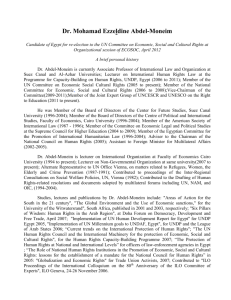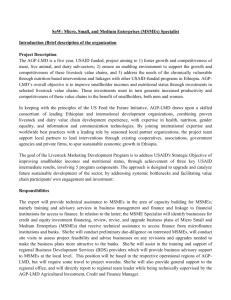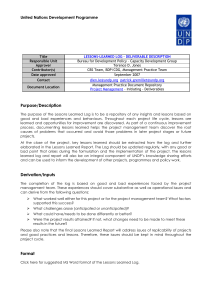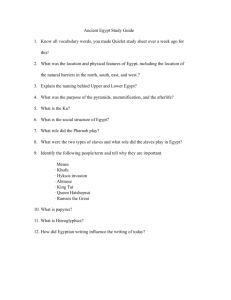UNDP's Support to MSMEs in Egypt
advertisement
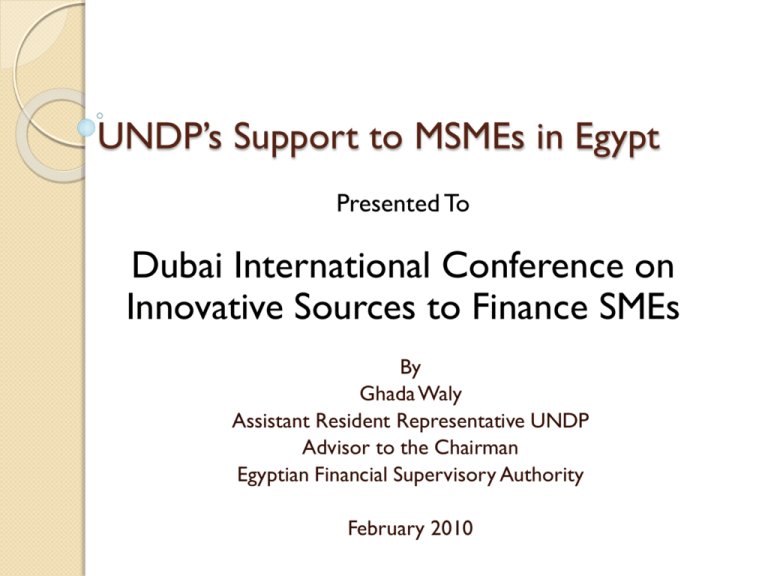
UNDP’s Support to MSMEs in Egypt Presented To Dubai International Conference on Innovative Sources to Finance SMEs By Ghada Waly Assistant Resident Representative UNDP Advisor to the Chairman Egyptian Financial Supervisory Authority February 2010 Overview of MSMEs in Egypt In 2006: 2.4 million private establishments (70,000 new enterprises are established yearly). Employment in MSEs climbed to 6.43 million in 2006 (60% since 1998) The highest growth was in enterprises with 1-4 workers (50% of non-agricultural private sector employment). Employment in firms with more than 50 workers has not grown at a comparable rate. Sectoral Distribution of MSMEs in Egypt Sectoral Distribution of MSEs (CAPMAS, 20002001) 15% 16% Manufacture 69% Trade Service The Missing Middle The Missing Middle: The Share of Manufacturing Enterprises in Employment Italy Spain Japan Micro SME UK Large Jordan Egypt 0% 20% 40% 60% 80% 100% MF Industry In Egypt Around 280 MF Programs (NGOs and Banks) serve 1.13 million active clients with a total outstanding portfolio of 1.8 billion EGP. Average loan size is estimated at approximately EGP 1,600 (low average due to step lending methodology / group lending). The estimated penetration rate is 6% Almost 50% of the active clients are poor women in MF MF Industry In Egypt Upper Egypt, 499,088, 44.2% Urban, 217,621 , 19.3% Lower Egypt, 395,029 , 35.0% Frontier, 17,384 , 1.5% Low Share in Value Added Share of Enterprise Size Categories in Total Private Sector Manufacturing Net Value Added 1.44% 6.06% 19.05% 73.45% Micro Small Medium Large UNDP’s Support to MSMEs Poverty Reduction is at the center of UNDP’s work in development as it relates to MDG Goal 1 aiming at cutting poverty in half UNDP in Egypt and the region supports countries formulate, implement and monitor policies and programs centered on inclusive growth UNDP’s support includes strategy development, diagnostic studies, capacity development, local and national linking to international best practices and promotion of South-South Cooperation UNDP’s Support to MSMEs UNDP also helps in creating an enabling environment for access to a broad range of financial services, supporting the role of the private sector and MSEs as potential vehicles for generating growth and employment, reducing poverty, and providing the poor with greater access to markets, goods and services. Supporting the Establishment of an APEX Funding Agency – SFD UNDP supported the creation of SFD in Egypt to mitigate the impact of the economic reform and structural adjustment program and to promote and develop the MSMEs sector by providing institutional and technical support to date. Since its establishment, SFD has mobilized more than 11 billion EGP. SFD created over a million jobs in small enterprises and 800,000 jobs in microenterprises. Supporting the Establishment of an APEX Funding Agency – SFD Activities include: ◦ Development and finance for SMEs ◦ Develop capacity of intermediary funding agencies, banks and NGOs ◦ Provide non-financial business development services ◦ Improve job market by building capacity of government employment offices ◦ Improve legal and policy environment for SMEs (Law 141 of 2004 assigned SFD as the coordination body and identified incentives for MSMEs). Introduced Best Practices of Microfinance MicroStart Program was developed in 1999 through a UNDP/UNCDF coordination to support the development of the microfinance sector MicroStart was implemented by UNDP in Egypt, Morocco, and Yemen. In Egypt, it worked with SFD and three NGOs. Introduced Best Practices of Microfinance Objectives: ◦ Provide SFD with a best practice model based on CGAP’s policies and guidelines ◦ Develop at SFD a sustainable access to credit model with a micro-capital grant component ◦ Build capacity of NGOs to transform into MFIs with a strong MIS component Business Development Services to MSMEs Based on a very successful job creation program that UNDP implemented in Bulgaria called JOBS, “BEST” was developed (2004-2007). BEST created a foundation for the provision of business support services in addition to credit to micro and small enterprises in (4) poor governorates. Business Development Services to MSMEs Among other services, BEST provided training on: - Marketing Pricing and Packaging Foreign Languages Taxes and Trade Laws ICT services Incubators for small beginning entrepreneurs Linkages to market Innovative products and services (bee hive pharmacy) Donor Coordination In line with its strategic coordination role, UNDP has established and co-shared with CIDA for the period of 2003-2009 the MSME Sub-donor group where all donors funding MSMEs were invited to a monthly meeting. Government, private sector and NGOs were invited to this forum as relevant. Donor Coordination Objectives: ◦ ◦ ◦ ◦ Information sharing Planning coordination Implementing joint activities Adopting common policy position and advocate together The group proved to be of strategic importance and impact A National Strategy for Microfinance In 2005, UNDP led the development of a National Strategy for MF which was launched and adopted by the government. Approach: consultative and inclusive of all stakeholders Ownership: Nationally led by EBI (training arm of CBE) Process: included roundtable discussions, background policy papers, field visits to countries with advanced experiences, policy briefs. A National Strategy for Microfinance The National Strategy was developed in 2004 and launched in 2005 with the objective of “developing a microfinance industry in which sustainable financial services for lower market segments are integrated into the overall development of a broad, inclusive, and diverse financial sector” The Strategy set a number of recommendations on the institutional, supporting infrastructure and regulatory environment levels A National Strategy for Microfinance Among Key Recommendations: Regulations - Revise legislation to allow for the establishment of non-bank commercial MFIs, and the transformation of successful NGOs into commercial MFIs. Infrastructure - Support the establishment of an MFI network Institutional – Support product development and diversification; and standardization of reporting UNDP and Growing Inclusive Markets (GIM) The GIM report was launched globally with an Egypt GIM report 2007/2008, documenting CSR models of PS where inclusion of MSMEs was core. The Egypt Report entitled Business Solutions for Human Development focused on enterprise solutions that accelerate and sustain access by the poor to needed goods and services. Poor were included as consumers, producers or service providers. Inclusive business models were documented in urban and rural areas. UNDP and Growing Inclusive Markets (GIM) Both reports had as goals: ◦ Raise awareness about doing business with the poor, how beneficial it is for businesses and the poor ◦ Show how to create value for all cooperation models between government, CSO and PS ◦ Inspire the PS to include MSMEs in value chains GSB Model – Growth of Sustainable Businesses 2009 Pro-poor programming introduced the concept of inclusive markets programming which develops markets that include the poor in the demand side as clients, customers, and the supply side as employers, producers, and business owners along value chains. The project is being implemented with Ministry of Industry to have large enterprises include MSMEs in the production chain. Challenges Facing MSMEs in Egypt Demand Related: ◦ ◦ ◦ ◦ Weak Effective Demand Exports Limited, Non-structured, and Uncoordinated Marketing Channels Lack of Linkages with Larger Firms Challenges Facing MSMEs in Egypt Input Constraints ◦ ◦ ◦ ◦ ◦ Technology Lack of Access to Finance Limited Access to Adequately Priced Inputs Lack of Access to Information Lack of Access to Business Development Services Process Constraints ◦ ◦ ◦ ◦ Management know-how Quality control Just in time production Skilled labor Challenges Facing MSMEs in Egypt Education and Training ◦ Little formal technical, entrepreneurial or management training ◦ Only 3.4% of entrepreneurs received any technical education prior to starting the enterprise ◦ Often with limited basic education. ◦ Know-how acquired in a family business or previous employment. ◦ Dissolution of traditional apprenticeship system. ◦ Less than 10% of enterprises reported that their workers received any form of training Challenges Facing MSMEs in Egypt Legal and Regulatory ◦ Advances made by Egypt in this field are mainly related to FDI and large businesses. ◦ Egyptian entrepreneurs spend 35% of their time solving problems related to government regulation. ◦ Red tape impacts more negatively on MSEs, since they lack the human and material resources to deal with bureaucratic procedures. Waqf Support to SMEs Waqf Funds can be used to: Develop Islamic Finance Products designed for micro, small and medium enterprises Establish a Regional Finance Institute to build the capacity of practitioners in banking and non-banking financial services Fund access to new technologies to include MSMEs in value chains Waqf Support to SMEs Provide special support to start up projects in strategic sectors usually declined from regular financial institutions Help develop intermediaries who in their turn should support market integration of MSMEs UNDP Support UNDP can support in: Designing Setting up management structures Providing policy advice Thank you
